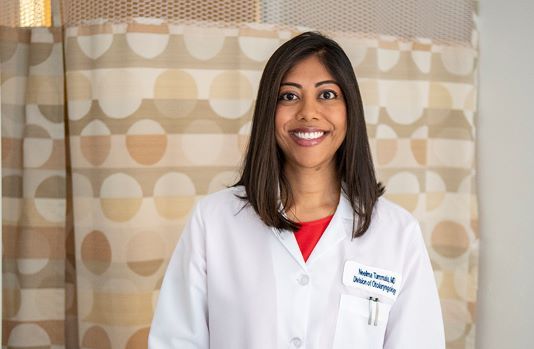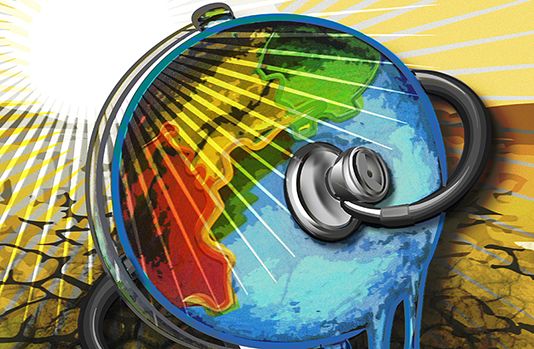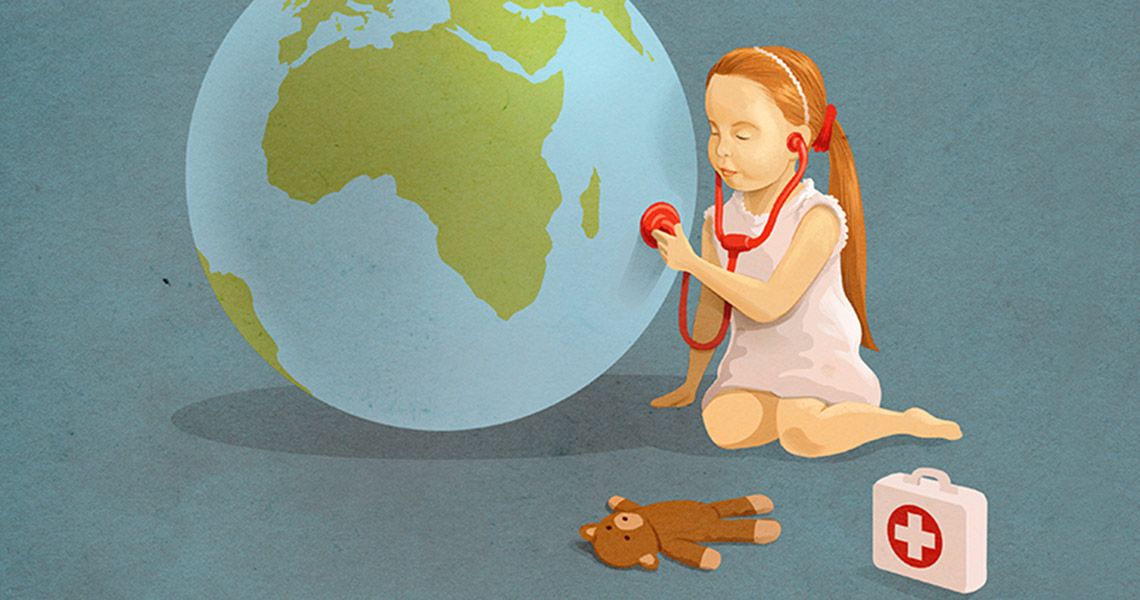The memory that’s sharpest around the edges is of a mother of five, recalls Harleen Marwah, MD ’21. The children, learned Marwah, then a medical student at the George Washington University (GW) School of Medicine and Health Sciences (SMHS), all suffered from moderate to severe asthma. The mother had to keep the kids inside, away from their friends, because of poor air quality in her community. The lack of outside activity subsequently sparked anxiety about their health, both physical and social.
“It breaks her heart,” says Marwah, now a pediatrics resident at the Children’s Hospital of Philadelphia. “When I think about the impact of climate change on my patients, I think about this family and so many others with similar stories.”
DIRECT EFFECTS
The warming of the planet has had dire consequences, according to the latest Lancet Countdown, an annual report on climate change impacts on health: spiking rates of heat-related deaths; farther-spreading infectious diseases such as Dengue fever, malaria, and West Nile virus; more lung disease-related deaths stemming from fossil fuel-driven air pollution.
These impacts reverberate across populations, from children suffering from asthma, like Marwah’s patients, to the elderly grappling with worsening chronic conditions and prolonged heat exposure.

Additional health issues that have cropped up include increased acute kidney injury or kidney failure, cardiovascular diseases and heart failure, and mental health issues. Water- and food-borne diseases, such as cholera and diarrheal diseases, are also more prevalent. It doesn’t stop there, says climate change activist and writer Neelima Tummala, MD. Climate change has contributed to longer and more intense pollen seasons, which is exacerbating her patients’ environmental allergies.
“In the U.S., the communities most impacted [by climate change] include, but are not limited to, low-income communities, outdoor workers, some communities of color, children, and the elderly,” explains Tummala, a clinical assistant professor of surgery at GW SMHS and an ear, nose, and throat specialist at The GW Medical Faculty Associates (MFA). “Communities of color are often disproportionately exposed to heat from urban heat islands, which developed in part due to historically racist housing practices, such as redlining. For those of a lower socioeconomic status, they are at increased risk from extreme heat because they may not have adaptation strategies, such as access to shelter, air conditioning, or adequate water.”
Unfortunately, the environmental justice concerns of climate change stretch far past the United States. Globally, Tummala says, many of the low-income countries producing the lowest amount of greenhouse gasses are among the most negatively impacted by climate change. In addition to public health concerns, many countries in the global south are facing drought and land insecurity, which may limit food and water supplies, potentially resulting in violence or mass migration.
With such a bleak future, many practicing physicians, residents, and medical students are promoting urgent action to preserve the planet — and our own — well-being.
MAKING A DIFFERENCE

Marwah, a native Californian whose teen years were punctuated by rampant wildfires and recurrent droughts, recognized a knowledge gap in a critical area: medical school. In August 2019, she cofounded Medical Students for a Sustainable Future, or MS4SF, to create a community of medical students who can “catalyze action on climate to protect the health of our patients.” The organization has since grown to hundreds of active members at more than 105 medical schools around the world.
“MS4SF tackles the climate crisis in meaningful and innovative ways through advocacy, research, education, climate-smart health care, partnerships, communications, plant-based health, and ocean health,” Marwah says. “MS4SF has supported a student-led podcast series, has led meetings with congressional representatives, and regularly hosts national journal clubs on the latest evidence regarding health and climate.”
Savita Potarazu, BS ’19, an MD/MPH student at GW SMHS, serendipitously met Marwah during a collaboration on COVID-19 response efforts. As an undergraduate, Potarazu had delved into climate change, focusing her senior thesis on the impact of climate change on health.
“Given my background, I instantly got involved [with MS4SF] and applied to be a co-chair for the climate-smart health care branch. As a leader, I sought to cultivate creative spaces for my colleagues at various medical schools across the country and world,” says Potarazu. “The bottom line is that our voices as medical students are more powerful than we think, and we can use this to our advantage when moving in the direction of progress in modern medicine.”
Through MS4SF, Potarazu, Marwah, and other medical students, including GW SMHS fourth-years Sam Duffy and Emily Youner, crafted a guide for medical students to promote climate-conscious innovation at their medical and hospital institutions. They also helped to conduct research, lead advocacy events, and implement climate-smart health care projects. “My Green Doctor,” for instance, a free sustainability program, helps clinics adopt cost-saving, environmentally friendly measures.
Moreover, the team of students, notes Hana Akselrod, MD, assistant professor of medicine at GW SMHS and an infectious disease specialist at the GW MFA, conducted a review of the medical curriculum for GW’s Planetary Health Report Card, which, in part, assesses interdisciplinary research, curricula, and sustainability at universities.
“Given how extensive the impact of climate change can be on health, it is important that medical students approach it like we have with the COVID-19 pandemic, the opioid epidemic, [and] the obesity epidemic. We should not be waiting until its effects ravage our health care system, economy, and patients’ lives. We must be proactive,” Potarazu says, adding that she and a team of fellow medical students, including second-year GW SMHS students Taylor Brewer, Alison Hong, and Chelsea Holbrook, have championed integrating ecomedical literacy into the whole medical curriculum. “Personally, I am frequently overwhelmed by the magnitude of the problem and must remind myself that any action taken in the direction of sustainable health care is better than no action at all.”
|
ADVOCATES FOR CHANGE In addition to the George Washington University (GW) Climate and Health Institute, GW boasts several climate change initiatives, including: Sustainable GW, which aims to eliminate single-use plastics, achieve carbon neutrality by 2030, and increase stormwater capture and biodiversity on campus, among other environmental-related goals; Environmental Justice Action Network, a student-led organization focusing on education, advocacy, and action, such as volunteering with marginalized communities to decrease environmental stressors; Air, Climate, and Health Lab at the GW Milken School of Public Health (Milken SPH), which investigates the overlaps among climate change, air quality, public health, and environmental policy; Climate Media Lab at Milken SPH, which uses data-based approaches to design climate communication; and Planet Forward, a GW School of Media and Public Affairs project that prioritizes environmental storytelling and acts as an engagement platform for GW’s sustainability initiatives. |
A MATTER OF TIMING
Marwah didn’t just set her sights on medical students to usher in change; she also advocated for curricular changes at the administration level. Just as Marwah approached Senior Associate Dean for Clinical Public Health Lawrence “Bopper” Deyton, MD ’85, MSPH, about the issue, so too did Akselrod.
“In 2019, I reached out to Dean Deyton, saying, ‘I’m a member of the Clinical Public Health faculty group, and I’m really passionate about climate change and health,’” recalls Akselrod. “‘Do we have anything in the curriculum about the health effects of climate change? Can I develop a session on it?’”
That session, with Tummala and Akselrod, has grown far beyond the bounds of one lecture. Climate change and health is now beginning to appear longitudinally across the curriculum, with content tailored for the preclinical and clinical years. First- and second-year students, for example, learn the mechanisms of health and disease and focus on social determinants of health and environmental health.
They also hear from guest speaker experts who discuss aspects of climate change and the impact on the body. These speakers, Akselrod adds, exemplify different ways physicians may professionally engage with climate change. Air quality and wildfires, vector-borne diseases and mosquitoes, and nutrition and access to care are all hallmarks of this curriculum. By their third year, students are ready to tackle the problem through case-based exercises.
“We’re in a really exciting part of this work. We’re starting to see what it looks like longitudinally as the first class that has experienced pieces of the curriculum is maturing and going from preclinical to clinical and then onward,” Akselrod says. “We’re starting to get more feedback and shape the next steps of what climate and health looks like integrated throughout the four years [of medical school].”
THE NEXT STEP
While GW SMHS has embraced its burgeoning knowledge base on climate change, schools across the university have done the same. In 2020, Tummala and Akselrod connected with Susan Anenberg, PhD, one of the guest speakers for the GW SMHS sessions. Anenberg, associate professor of environmental and occupational health and of global health at the GW Milken Institute School of Public Health (Milken SPH), is the director of the GW Climate and Health Institute.
The institute, Anenberg says, comprises faculty from medicine, public health, engineering, international affairs, geography, education, law, business, media and public affairs, and more who share information on climate change and health, build relationships, and connect research and teaching. Moreover, GW is positioned to effect change, thanks to its deep connections in the policy process, its comprehensive research, and the leadership among engaged students such as Marwah and Potarazu.
LONG-TERM GOALS
With momentum and activism — and urgency — building, GW is shifting. The Milken SPH now offers a master’s of public health with concentration in climate and health, in addition to several existing classes across schools.
On a greater scale, Akselrod envisions GW as a leading institution on climate change, as it is in the HIV/AIDS world through the District of Columbia Center for AIDS Research (DC CFAR). A consortium of area universities led by SMHS and Milken SPH researchers, the DC CFAR aims to increase knowledge and reduce the impact of the HIV pandemic in the District.
“Imagine something like the DC CFAR emerging in the next decades, but around climate change impacts on health, rather than on infectious disease and health,” Akselrod says. “GW, leading D.C.-area institutions to reduce the impact of something that’s happening globally in our local communities and working with the people who are among the most oppressed. That would be the grand vision.”




